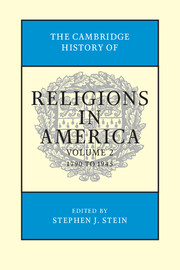Book contents
- Frontmatter
- Contents
- Contributors
- Editor's Introduction
- SECTION I RELIGION IN NORTH AMERICA
- SECTION II RELIGIONS IN THE NEW NATION, 1790–1865
- SECTION III CHANGING RELIGIOUS REALITIES
- SECTION IV RELIGIOUS RESPONSES TO MODERN LIFE AND THOUGHT
- 21 Religion and Immigration, 1865–1945
- 22 Religion and the Modern City, 1865–1945
- 23 Religious Responses to Industrialization, 1865–1945
- 24 Religious Responses to Modern Science, 1865–1945
- 25 Religious Responses to Philosophy in America, 1865–1945
- 26 Fundamentalism
- 27 Religiously Informed Social Reform and Reaction in the Era of the Great Depression
- 28 Nativism from the New Republic to the Cold War
- 29 Between God and Caesar: World War I and America's Religious Communities
- 30 World War II and America's Religious Communities
- SECTION V COMPARATIVE ESSAYS
- SECTION VI RELIGION AND DIVERSE AREAS
- Index
- References
28 - Nativism from the New Republic to the Cold War
from SECTION IV - RELIGIOUS RESPONSES TO MODERN LIFE AND THOUGHT
Published online by Cambridge University Press: 28 July 2012
- Frontmatter
- Contents
- Contributors
- Editor's Introduction
- SECTION I RELIGION IN NORTH AMERICA
- SECTION II RELIGIONS IN THE NEW NATION, 1790–1865
- SECTION III CHANGING RELIGIOUS REALITIES
- SECTION IV RELIGIOUS RESPONSES TO MODERN LIFE AND THOUGHT
- 21 Religion and Immigration, 1865–1945
- 22 Religion and the Modern City, 1865–1945
- 23 Religious Responses to Industrialization, 1865–1945
- 24 Religious Responses to Modern Science, 1865–1945
- 25 Religious Responses to Philosophy in America, 1865–1945
- 26 Fundamentalism
- 27 Religiously Informed Social Reform and Reaction in the Era of the Great Depression
- 28 Nativism from the New Republic to the Cold War
- 29 Between God and Caesar: World War I and America's Religious Communities
- 30 World War II and America's Religious Communities
- SECTION V COMPARATIVE ESSAYS
- SECTION VI RELIGION AND DIVERSE AREAS
- Index
- References
Summary
America's religious history rests on an unsettling pattern of contradiction. While the United States has served as a refuge for generations of newcomers fleeing religious persecution abroad, the nation has simultaneously been the site of intense interreligious conflict and persecution. This essay sketches an outline of America's religiously inspired prejudice from the late eighteenth century through 1945, arguing that such intolerance informed a broad range of American cultural biases. In popular literature, social movements, legal decisions, and military or political campaigns, America's aspiration to serve as the world's religious safe haven clashed uncomfortably with the harsh reality of domestic turmoil.
Ironies abound in the study of America's religiously inspired xenophobia. The task of identifying examples of religious persecution can be problematic, since victims can also be perpetrators. For instance, while Catholics endured generations of discrimination on the grounds of their alleged “foreign” demeanor, they also lashed out at “heathen” Asian immigrants on the West Coast, and the outspoken Catholic priest Father Charles Coughlin broadcast vehemently anti-Semitic messages to millions of radio listeners in the 1930s. More often, however, religious conflict signaled an attempt to define the United States in largely or exclusively Protestant terms and to rally the nation against a perceived enemy lurking within American borders.
DEFINING NATIVISM
In a famous letter addressed to the Jews of Newport, Rhode Island, in 1790, George Washington proclaimed that the new American republic “gives to bigotry no sanction, to persecution no assistance.”
- Type
- Chapter
- Information
- The Cambridge History of Religions in America , pp. 616 - 633Publisher: Cambridge University PressPrint publication year: 2000



